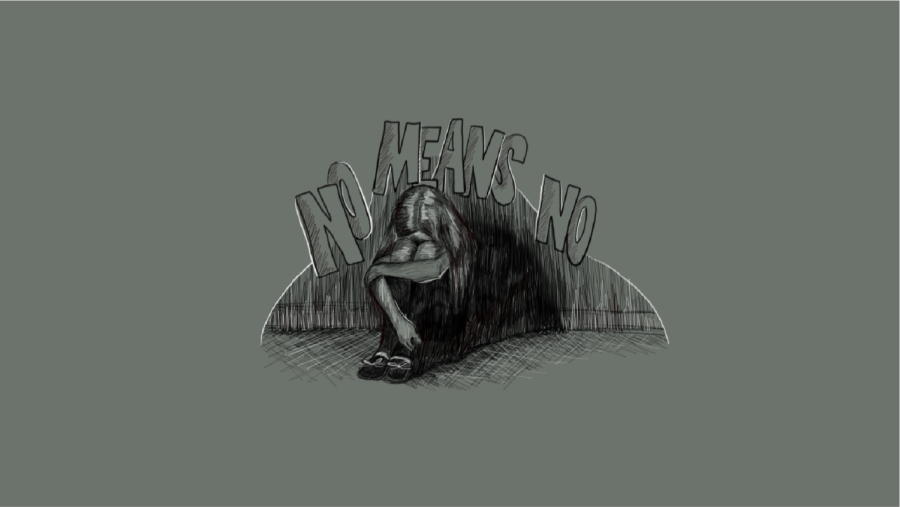Hibben: Sexual Violence Prevention Starts with Harsher Consequences
(Graphic by Storey McDonald | The Daily Utah Chronicle)
January 29, 2022
Content warning: This article discusses sensitive information pertaining to sexual violence. If you have experienced sexual violence, please call the National Sexual Assault Hotline at 1-800-656-4673.
House Bill 98, Sexual Offense Amendments, seeks to aid Utah’s struggle with sexual violence. Sponsored by Rep. Angela Romero, this bill creates a new felony offense for sexual contact without consent and adds those convicted of this crime to the Sex and Kidnap Offender Registry. It stresses the importance of consent and creates a stronger penalty for any non-consensual sexual contact — not only rape, assault or abuse. Affirmative consent can be revoked between sexual acts and “affirmative consent initially given may be withdrawn through words or conduct at any time before or during sexual activity.”
The bill targets concerns in Utah over rising sexual violence rates. Utah’s top violent crime, rape, is higher than the national average. One in every three Utah women will experience some kind of sexual violence in their lifetime, and 1 in 25 Utah men will experience either rape or attempted rape. By expanding the definition and increasing penalties, the bill will hopefully curb sexual violence rates in Utah.
H.B. 98 will expand Utah’s criminal code and could likely raise the importance of consent in Utah, which would reduce sexual violence. While Utah continually fails to enact other policies to prevent sexual violence, this violence continues to cost Utah’s economy billions each year. Preventing sexual violence will not only protect Utahn’s health and wellness, but will also strengthen our state’s economy.
Utah’s Sexual Violence Climate
Utah has an incredibly concerning sexual violence climate. Utah’s rape rate is the 11th highest in the United States. At the University of Utah, reports of rape in 2020 increased by almost 70% compared to 2018.
This bill could possibly increase rates of reporting. Statewide, we have alarmingly low rates of reporting while having a higher-than-average rate of rape. We never file charges for eight out of every nine sexual assault cases, meaning that over 90% of reported cases never get a conviction. The Utah Commission on Criminal and Juvenile Justice found that only 11.8% report sexual assault to police. It’s important to have accurate reports of rape to know the true scale of sexual violence in Utah and to prevent it from happening to others.
The Importance of Consent
Utah’s current criminal code does not include the words “affirmative consent” or “freely given consent.” However, H.B. 98 includes both, which would give Utah a clear definition of consent instead of skirting around the definition.
While typically thought to be an inherently sexual term, consent simply means respecting the wishes of another. Asking your friend for permission to post a selfie on Instagram, or Zoom asking to record your image during class both act as examples of consent.
Passing this bill could raise concerns of potential perpetrators who wish to avoid a felony conviction and protect all individuals in Utah. Acknowledging that consent is crucial to sexual contact demonstrates that our state believes in the right to say no.
Also, because this bill increases penalties for unwanted sexual contact, it could help victims have faith in real, long-term punishments for the perpetrator instead of disappointingly short sentences. The traumatic process to report and file charges for sexual violence often has lacking results. Raising sexual contact without consent to a felony could help victims file their cases in criminal court with confidence of a conviction.
The bill can also help us add additional criminals to the Sex and Kidnap Offender Registry. This will better protect communities and amplify punishment for those who would’ve only been convicted of a misdemeanor in the past.
Steps for the Future
However, Utah should be taking other steps to prevent sexual violence. Utah still doesn’t allocate enough funds towards preventative solutions and does not allow schools to teach about consent. We have disappointedly sparse sexual education, despite parents’ concerns over a lack of clear communication about sexual boundaries.
While this legislation clearly states what consent means, our children are not educated on this topic in school. This prevents students from understanding the importance of consent to prevent sexual violence. It also fails our children by not giving them the definitions necessary to realize if they were a victim of sexual violence.
Without these definitions, children are unable to report clearly to adults what happened, and may not even comprehend that they are a victim of sexual abuse. As someone who experienced sexual violence and knows others in my situation, knowing what happened to you and who to report to is crucial to stopping the perpetrator. Utah should pass bills similar to H.B. 98 that teaches consent and how to report any abuse in schools.
The Utah Department of Health called sexual violence in Utah a “serious public health problem,” and yet the state continues to ignore solutions. H.B. 98 addresses the need for stronger criminal punishment for perpetrators of any sexual crime. It also acknowledges the importance of consent and affirms a statewide belief in victims. The Utah State Legislature should pass H.B. 98 to protect future generations from harmful, traumatic violence.










AABW • Feb 2, 2022 at 11:03 pm
https://www.cnn.com/2022/02/02/us/utah-university-suspends-greek-life-sexual-assault/index.html
Apparently our campus is famous enough for being the center of sexual assault and anti-feminist.
As a former epidemiologist here in the state, I can nod my head in shame entirely at the patriarchial culture everywhere here.